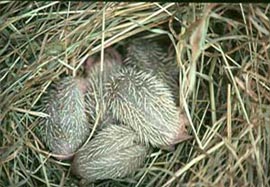
Not every hedgehog needs help – but every rescue must be appropriate!
You can obtain all our (German) publications from our office or with the Online order form.
Many hedgehogs spend the winter in human custody. They were found the previous autumn as weak, usually sick juveniles and without human help they would have had no chance of surviving the winter. After medical treatment and plenty of food they hibernated in captivity. Now comes the time to say farewell: the hedgehog is awake again and must go back into the wild.
The hedgehog will need to gain weight again after hibernation before it is released. Two or at most three weeks of good food, full of fat and protein, will be enough for the fostered hog to regain his lost weight. When the erstwhile juvenile weighs about 650-700g he is well equipped to survive independently in the wild.
The hedgehog should be released, if possible, where he was found, and preferably at dusk! In most cases the place where he was found will be good hedgehog habitat. Hedgehogs have an excellent spatial memory, they settle down better and more quickly in familiar territory than in a new area. If the hedgehog was found in or around your own garden you can continue to provide him with cat food every evening for the next couple of weeks.
The popular practice of “Hedgehog Tourism” is to be avoided. If a hedgehog is arbitrarily released “into the wild”, you often do not know what sort of conditions await the animal there. Human intervention in the life of the hedgehog must be kept to an absolute minimum! The relocation of an animal is only justified in a few special cases, for example, if there is a particular hazard where he was found, a building site or a busy road.
If you really must find a new location for the hedgehog, please seek the help of experts, for example, hedgehog rescue centres, conservation societies or (in Germany) the “Untere Naturschutzbehörde” (= Lower Conservation Agency).
You will find further information under Release.
In the warmer regions of Germany, female hedgehogs give birth as early as June or July, however, the main breeding season is in the months of August and September..
Nests are usually built under bushes, in hedges or under piles or leaves or branches. Hedgehog nests with babies can also be found under tarpaulins or other material used to cover things.? (Do you mean plastic sheeting used for mulching or protecting crops??) These places should be left alone to allow the hedgehog to raise her young successfully.
If you should accidentally disturb a hedgehog nest with young, please do not change or move anything. Mother hedgehogs do not tolerate any disturbance to their nest. Stress, caused by disturbance, can lead to the mother abandoning or even killing her young. At best she will move to another nest with her babies. Even this places a strain on the mother. “Emergency” nests will not be of the same quality as the original nest – either with regard to location or construction. The job of successfully rearing the young is thus made even more difficult.
Orphaned hoglets crawl out of the nest during the daytime and squeak like baby birds. If you should find orphaned hoglets, there is more information under Rearing orphaned hoglets.
Many people want to help their prickly garden visitor over the winter and many animal lovers believe that they must pick up every hedgehog they see to be sure he will survive the winter. Many hedgehogs are taken from the wild unnecessarily – and therefore illegally..
You will help hedgehogs most by having a natural, easily accessible garden which offers them both food and accommodation. Hedgehogs will find their winter quarters and nesting material under bushes and hedges. You can give them extra hiding places by building a pile of brushwood or a hedgehog nest box in a sheltered spot.
Especially in autumn, you can really help hedgehogs by providing a feeding station, so that they gain sufficient weight for hibernation. Then it often becomes unnecessary to bring juveniles into care. They should weigh about 500g by the beginning of November to ensure that they have a good chance of surviving their first hibernation. Mature hedgehogs, especially females, who have lost weight through rearing their young – are grateful for extra rations before hibernation when natural food is scarce. Advice on how to help hedgehogs in the garden can be found under Hedgehog friendly garden. .
Even the best food will not help a sick hedgehog! If a small hedgehog constantly comes to the feeding station and is just not round and fat– then you will need help for him and a visit to a hedgehog rescue centre or the vet is called for! Find out more about this under Hedgehog found – what to do?
Hedgehogs hibernate to get them through the time of the year when food is scarce. They build a warm nest under a supporting structure like a hedge or bush, or under a log pile. The temperature inside the nest should never fall below freezing. The necessary heating is provided by the hedgehog burning up the fat reserves he laid down during the summer and autumn. At the same time he sustains himself by reducing his metabolism to a minimum.
Adult male hedgehogs go into hibernation really early, from about the end of October. Then the females follow about a month later. Juveniles start hibernating even later. They go on looking for food the longest, as they need to put on as much weight as possible to ensure their survival.
However, not all young hedgehogs succeed in gaining sufficient weight to hibernate successfully. Frequently, little emaciated hedgehogs can be seen wandering about in winter in the ice and snow and they will be sentenced to death without immediate human help. Sick adult hedgehogs, in need of help, can also be seen wandering about, usually during the day. If you find a hedgehog in trouble, please read Hedgehog found – what to do?
You should never disturb a hibernating hedgehog, if you clear round his nest in the log pile or destroy it in the garden when you are trying to catch up with autumn tasks. It’s not just that a hedgehog cannot build a new nest in winter but the arousal process uses up a lot of energy, body temperature, circulation, respiration and heart rate must all accelerate in a relatively short time.






